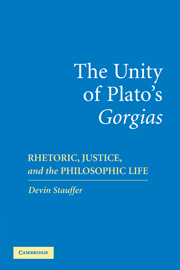Book contents
Conclusion: A Final Reflection on Noble Rhetoric
Published online by Cambridge University Press: 30 July 2009
Summary
Especially if it is right to have doubts that Socrates himself is genuinely convinced of the truth of the account of the afterlife that he presents to Callicles, his presentation of that account may be regarded as an example of noble rhetoric. Certainly, one of the virtues of the account is that it portrays the philosophic life in a light that, were the account to be believed, would lessen people's anger toward that life and win it respect. But how believable is Socrates' account? Socrates himself says that he is not very optimistic that Callicles will believe it. And he may not have had high hopes that Callicles would believe even his claim that he believes it himself (consider again 523a1–3, 527a5–9). If Callicles' silence at the end of the dialogue reflects this likely skepticism, he would not be unlike many readers of the Gorgias, who do not hesitate to refer to Socrates' account as a myth, despite his insistence that it should be regarded as a logos. Socrates' account, I would suggest, is not meant to be – at least not in any simple or direct way – the primary model of the kind of noble rhetoric to which Socrates is pointing in the Gorgias. But if the account at the end of the dialogue is not the primary model of noble rhetoric, and yet Socrates is nonetheless calling for a new kind of rhetoric, what would be the character of such rhetoric?
- Type
- Chapter
- Information
- The Unity of Plato's 'Gorgias'Rhetoric, Justice, and the Philosophic Life, pp. 177 - 182Publisher: Cambridge University PressPrint publication year: 2006

